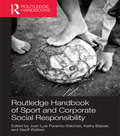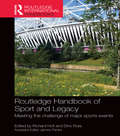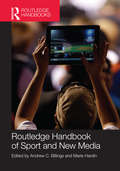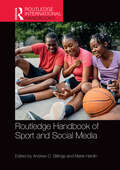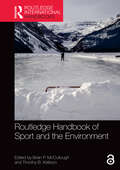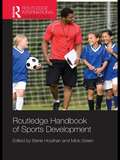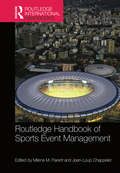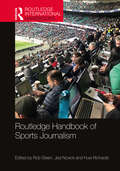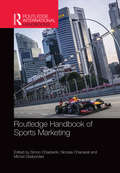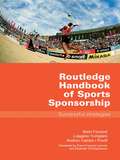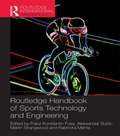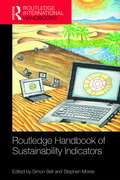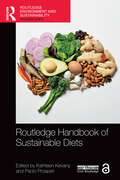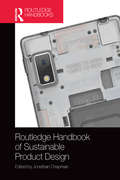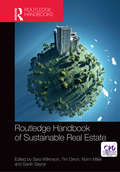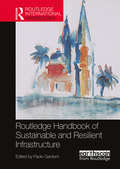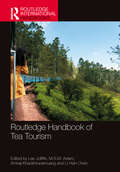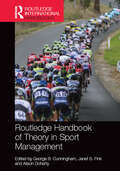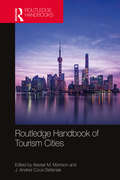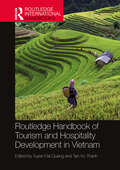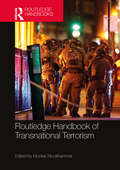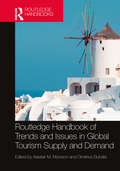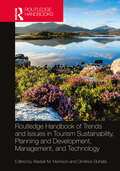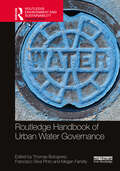- Table View
- List View
Routledge Handbook of Sport and Corporate Social Responsibility (Foundations of Sport Management)
by Juan Luis Paramio-Salcines Kathy Babiak Geoff WaltersAs the role of sport in society becomes ever more prominent and as sports organisations become increasingly influential members of the global community, so it has become more important than ever for sport to consider its wider social responsibilities. The Routledge Handbook of Sport and Corporate Social Responsibility is the first book to offer a comprehensive survey of theories and concepts of CSR as applied to sport, and the social, ethical and environmental aspects of sport business and management. It offers an overview of perspectives and approaches to CSR in sport, examines the unique features of the sport industry in relation to CSR, explores the tools, models, common pitfalls and examples of best practice on which managers can draw, and discusses how CSR and corporate citizenship can be integrated into the sport management curriculum. The book covers every key issue and functional area, including implementation, strategic benefits, communication and corporate image, stakeholder engagement, and the measurement and evaluation of CSR policies and practices, and includes detailed international case studies, from the NBA and the Olympic Games to Japanese soccer. The Routledge Handbook of Sport and Corporate Social Responsibility is important reading for any student, researcher, manager or policy maker with an interest in sport business, management, ethics or development.
Routledge Handbook of Sport and Legacy: Meeting the Challenge of Major Sports Events (Routledge International Handbooks)
by Dino Ruta Richard HoltWhat remains of a great sporting spectacle after the last race is run or the final match is played? How can the vast expense of mounting such events be justified? What if there is nothing left behind or what if the legacy is negative, a costly infrastructure which is unused or a debt-ridden host city? The Routledge Handbook of Sport and Legacy addresses perhaps the most important issue in the hosting of major contemporary sporting events: the problem of ‘legacy’. It offers a rigorous, innovative and comparative insight into this contested concept from interdisciplinary and practical perspectives. Major events must now have a conscious, credible and defined policy for legacy to meet public expectations. The book provides a comprehensive survey of the various kinds of legacy that can be delivered, as well as a close examination of the potential benefits and practical challenges involved in each. From ‘hard’ legacies, such as stadia and infrastructure, to ‘soft’ legacies including skill development, attitude change and capacity building, the book offers both a historical case study and an innovative strategic management approach, and establishes the limits of what can realistically be achieved in terms of economic, social, cultural, physical and sporting development. The Routledge Handbook of Sport and Legacy includes contributions from world leading scholars and practitioners and features detailed case studies of major sports events from around the world, including the FIFA World Cup and ten Olympics Games from London in 1908 to London 2012. It is invaluable reading for students and researchers working in sport studies, events management, human geography, economics or planning, and an essential reference for any professional engaged in delivering legacy through sport.
Routledge Handbook of Sport and New Media: Routledge Handbook Of Sport And New Media (Routledge International Handbooks)
by Andrew C. Billings Marie Hardin Natalie A. BrownNew media technologies have become a central part of the sports media landscape. Sports fans use new media to watch games, discuss sports transactions, form fan-based communities, and secure minutiae about their favorite players and teams. Never before have fans known so much about athletes, whether that happens via Twitter feeds, fan sites, or blogs, and never before have the lines between producer, consumer, enactor, fan and athlete been more blurred. The Internet has made virtually everything available for sports media consumption; it has also made understanding sports media substantially more complex. The Routledge Handbook of Sport and New Media is the most comprehensive and in-depth study of the impact of new media in sport ever to be published. Adopting a broad, interdisciplinary approach, the book explores new media in sport as a cultural, social, commercial, economic, and technological phenomenon, examining the profound impact of digital technologies on that the way that sport is produced, consumed and understood. There is no aspect of social life or commercial activity in general that is not being radically influenced by the rise of new media forms, and by offering a "state of the field" survey of work in this area, the Routledge Handbook of Sport and New Media is important reading for any advanced student, researcher or practitioner with an interest in sports studies, media studies or communication studies.
Routledge Handbook of Sport and Social Media (Routledge International Handbooks)
by Andrew C. Billings Marie HardinThis handbook takes an in-depth look at the transformative impact of social media on sport. With broader and deeper coverage than any previous book on this topic, the handbook explores how sports media is co-created and curated, collectively, at the individual, group and organisational level, and considers the implications for the ways in which sports media, through social media, infiltrates our lives and influences local and global culture. Exploring key concepts and presenting original case studies, the book features work by world-leading international sports media scholars. It discusses the theoretical lenses through which we can understand social media and sport, from political economy and cultural dynamics to business and management, and explains the significance of global social media platforms. The book then presents a multi-level exploration of sport and social media, including social media use by fans, athletes, teams, leagues and media organisations. Offering important new insight into a technology that now sits at the centre of our social and economic lives, this book is important reading for any researcher, student, practitioner or policymaker with an interest in sport media, sport business, sport cultures, digital media technologies, digital business, or the broader relationships between sport, media and wider society.
Routledge Handbook of Sport and the Environment (Routledge International Handbooks)
by Brian P. McCullough Timothy B. KellisonThe natural environment is a central issue in both academic and wider societal discourse. The global sport industry is not immune from this discussion and has to confront its responsibility to reduce its impact on the natural environment. This book goes further than any other in surveying both the challenges and the opportunities presented to the sports industry as it engages with the sustainability agenda, exploring the various ways in which sport scholars can integrate sustainability into their research. With a multidisciplinary sweep, including management, sociology, law, events, and ethics, this is a ground-breaking book in the study of sport. Drawing on cutting-edge research, it includes over thirty chapters covering all the most important themes in contemporary sport studies such as: climate change, sustainability, and corporate social responsibility ethics, governance, and the law event management, tourism, and pollution marketing, branding, and consumer behavior the Olympics, urban development, and mega-event legacies. With contributions from world-leading researchers and practitioners from around the globe, this is the most comprehensive book ever published on sport and the environment.
Routledge Handbook of Sports Development (Routledge International Handbooks)
by Barrie Houlihan Mick GreenSports development has become a prominent concern within both the academic study of sport and within the organisation and administration of sport. Now available in paperback, the Routledge Handbook of Sports Development is the first book to comprehensively map the wide-ranging territory of sports development as an activity and as a policy field, and to offer a definitive survey of current academic knowledge and professional practice. Spanning the whole spectrum of activity in sports development, from youth sport and mass participation to the development of elite athletes, the book identifies and defines the core functions of sports development, exploring the interface between sports development and cognate fields such as education, coaching, community welfare and policy. The book presents important new studies of sports development around the world, illustrating the breadth of practice within and between countries, and examines the most important issues facing practitioners within sports development today, from child protection to partnership working. With unparalleled depth and breadth of coverage, the Routledge Handbook of Sports Development is the definitive guide to policy, practice and research in sports development. It is essential reading for all students, researchers and professionals with an interest in this important and rapidly evolving discipline.
Routledge Handbook of Sports Event Management
by Milena M. Parent Jean-Loup ChappeletFrom the Olympic Games to community-level competitions, sports events can be complex and pose a particular set of managerial challenges. The Routledge Handbook of Sports Event Management surveys the management of sports events around the world of every size and scale, from small to mega-events, including one-off and recurring events, and single-sport and multi-sport events. The book adopts a unique stakeholder perspective, structured around the groups and individuals who have an interest in and co-create sports events, including organising committees, promoters, sport organisations, spectators, community groups, sponsors, host governments, the media and NGOs. Each chapter addresses a specific stakeholder, defines that stakeholder and its relationships with sports events, describes the managerial requirements for a successful event, assesses current research and directions for future research, and outlines the normative dimensions of stakeholder engagement (such as sustainability and legacy). No other book takes such a broad view of sports event management, surveying key theory, current research, best practice, and moral and ethical considerations in one volume. With contributions from leading sport and event scholars from around the world, the Routledge Handbook of Sports Event Management is essential reading for any advanced student, researcher or professional with an interest in sport management, sport development, sport policy or events.
Routledge Handbook of Sports Journalism (Routledge International Handbooks)
by Huw Richards Rob Steen Jed NovickThe Routledge Handbook of Sports Journalism is a comprehensive and in-depth survey of the fast-moving and multifaceted world of sports journalism. Encompassing historical and contemporary analysis, and case studies exploring best practice as well as cutting edge themes and issues, the book also represents an impassioned defence of the skill and art of the trained journalist in an era of unmediated digital commentary. With contributions from leading sports-media scholars and practising journalists, the book examines journalism across print, broadcast and digital media, exploring the everyday reality of working as a contemporary reporter, editor or sub-editor. It considers the organisations that shape output, from PR departments to press agencies, as well as the socio-political themes that influence both content and process, such as identity, race and gender. The book also includes interviews with, and biographies of, well-known journalists, as well as case studies looking at the way that some of the biggest names in world sport, from Lance Armstrong to Caster Semenya, have been reported. This is essential reading for all students, researchers and professionals working in sports journalism, sports broadcasting, sports marketing and management, or the sociology or history of sport.
Routledge Handbook of Sports Marketing (Routledge International Handbooks)
by Simon Chadwick Michel Desbordes Nicolas ChanavatSports marketing has become a cornerstone of successful sports management and business, driving growth in sport organisations and widening fan-bases. Showcasing the latest thinking and research in sports marketing from around the world, the Routledge Handbook of Sports Marketing goes further than any other book in exploring the full range of this exciting discipline. Featuring contributions from world-leading scholars and practitioners from across the globe, the book examines theories, concepts, issues and best practice across six thematic sections—brands, sponsorship, ambush marketing, fans and spectators, media, and ethics and development—and examines key topics such as: consumer behaviour marketing communications strategic marketing international marketing experiential marketing and marketing and digital media Comprehensive and authoritative, the Routledge Handbook of Sports Marketing is an essential reference for any student or researcher working in sport marketing, sport management, sport business, sports administration or sport development, and for all practitioners looking to develop their professional knowledge.
Routledge Handbook of Sports Sponsorship: Successful Strategies
by Alain Ferrand Luiggino Torrigiani Andreu Camps i PovillThe Routledge Handbook of Sports Sponsorship provides a comprehensive guide to the successful management of sport sponsorship. From the development of an appropriate strategy to the implementation of the sponsorship operation through to post-event analysis, this book offers an authoritative reference for large and small events. The text also provides an accessible review of the legal issues associated with marketing, copyright and contracts in print, television and radio sponsorship, illustrated with a wealth of case studies. Includes: • Sports marketing and sports management theory.• Stage by stage analysis of the sponsorship process •The roles of different key stakeholders in the process • Thorough explanation of copyright and contract law for sports sponsorship• Major international sports sponsorship case-studies examined from concept stage through to post-event analysis. The Routledge Handbook of Sports Sponsorship is essential reading for students and a valuable reference for professionals in sports law, sports management, sports marketing and brand management.
Routledge Handbook of Sports Technology and Engineering (Routledge International Handbooks)
by Aleksandar Subic Franz Konstantin Fuss Martin Strangwood Rabindra MehtaFrom carbon fibre racing bikes to ‘sharkskin’ swimsuits, the application of cutting-edge design, technology and engineering has proved to be a vital ingredient in enhanced sports performance. This is the first book to offer a comprehensive survey of contemporary sports technology and engineering, providing a complete overview of academic, professional and industrial knowledge and technique. The book is divided into eight sections covering the following topics : Sustainable Sports Engineering Instrumentation Technology Summer Mobility Sports Winter Mobility Sports Apparel and Protection Equipment Sports Implements (racquets, clubs, bats, sticks) Sports Balls Sports Surfaces and Facilities Written by an international team of leading experts from industry, academia and commercial research institutes, the emphasis throughout the book is on innovation, the relationship between business and science, and the improvement of sports performance. This is an essential reference for anybody working in sports technology, sports product design, sports engineering, biomechanics, ergonomics, sports business or applied sport science.
Routledge Handbook of Sustainability Indicators (Routledge International Handbooks)
by Stephen Morse Simon BellThis handbook provides researchers and students with an overview of the field of sustainability indicators (SIs) as applied in the interdisciplinary field of sustainable development. The editors have sought to include views from the center ground of SI development but also divergent ideas which represent some of the diverse, challenging and even edgy observations which are prominent in the wider field of SI thinking. The contributions in this handbook: • clearly set out the theoretical background and history of SIs, their origins, roots and initial goals • expand on the disciplines and modalities employed to develop SIs of various kinds • assess the various ways in which SI data are gathered and the availability (over space and time) and quality issues that surround them • explore the multiplex world of SIs as expressed in agencies around the world, via examples of SI practice and the lessons that have emerged from them • critically review the progress that SIs have made over the last 30 years • express the divergence of views which are held about the value of SIs, including differing theories on their efficacy, efficiency and ethics • explore the frontier of contemporary SI thinking, reviewing ante/post and systemic alternatives This multidisciplinary and international handbook will be of great interest to researchers, students and practitioners working in sustainability research and practice.
Routledge Handbook of Sustainable Diets (Routledge Environment and Sustainability Handbooks)
by Kathleen Kevany and Paolo ProsperiThis handbook presents a must-read, comprehensive and state of the art overview of sustainable diets, an issue critical to the environment and the health and well-being of society. Sustainable diets seek to minimise and mitigate the significant negative impact food production has on the environment. Simultaneously they aim to address worrying health trends in food consumption through the promotion of healthy diets that reduce premature disability, disease and death. Within the Routledge Handbook of Sustainable Diets, creative, compassionate, critical, and collaborative solutions are called for across nations, across disciplines and sectors. In order to address these wide-ranging issues the volume is split into sections dealing with environmental strategies, health and well-being, education and public engagement, social policies and food environments, transformations and food movements, economics and trade, design and measurement mechanisms and food sovereignty. Comprising of contributions from up and coming and established academics, the handbook provides a global, multi-disciplinary assessment of sustainable diets, drawing on case studies from regions across the world. The handbook concludes with a call to action, which provides readers with a comprehensive map of strategies that could dramatically increase sustainability and help to reverse global warming, diet related non-communicable diseases, and oppression and racism. This decisive collection is essential reading for students, researchers, practitioners, and policymakers concerned with promoting sustainable diets and thus establishing a sustainable food system to ensure access to healthy and nutritious food for all.
Routledge Handbook of Sustainable Diets (Routledge Environment and Sustainability Handbooks)
by Kathleen Kevany and Paolo ProsperiThis handbook presents a must-read, comprehensive and state of the art overview of sustainable diets, an issue critical to the environment and the health and well-being of society. Sustainable diets seek to minimise and mitigate the significant negative impact food production has on the environment. Simultaneously they aim to address worrying health trends in food consumption through the promotion of healthy diets that reduce premature disability, disease and death. Within the Routledge Handbook of Sustainable Diets, creative, compassionate, critical, and collaborative solutions are called for across nations, across disciplines and sectors. In order to address these wide-ranging issues the volume is split into sections dealing with environmental strategies, health and well-being, education and public engagement, social policies and food environments, transformations and food movements, economics and trade, design and measurement mechanisms and food sovereignty. Comprising of contributions from up and coming and established academics, the handbook provides a global, multi-disciplinary assessment of sustainable diets, drawing on case studies from regions across the world. The handbook concludes with a call to action, which provides readers with a comprehensive map of strategies that could dramatically increase sustainability and help to reverse global warming, diet related non-communicable diseases, and oppression and racism.This decisive collection is essential reading for students, researchers, practitioners, and policymakers concerned with promoting sustainable diets and thus establishing a sustainable food system to ensure access to healthy and nutritious food for all.
Routledge Handbook of Sustainable Product Design
by Jonathan ChapmanAs a cultivated form of invention, product design is a deeply human phenomenon that enables us to shape, modify and alter the world around us – for better or worse. The recent emergence of the sustainability imperative in product design compels us to recalibrate the parameters of good design in an unsustainable age. Written by designers, for designers,?the Routledge Handbook of Sustainable Product Design presents the first systematic overview of the burgeoning field of sustainable product design. Brimming with intelligent viewpoints, critical propositions, practical examples and rich theoretical analyses, this book provides an essential point of reference for scholars and practitioners at the?intersection of product design and sustainability. The book takes readers to the depth of our engagements with the designed world to advance the social and ecological purpose of product design as a critical twenty-first-century practice. Comprising 35 chapters across 6 thematic parts, the book’s contributors include the most significant international thinkers in this dynamic and evolving field.
Routledge Handbook of Sustainable Real Estate
by Sara Wilkinson Tim Dixon Norm Miller Sarah SayceWith the built environment contributing almost half of global greenhouse emissions, there is a pressing need for the property and real estate discipline to thoroughly investigate sustainability concerns. The Routledge Handbook of Sustainable Real Estate brings together the latest research of leading academics globally, demonstrating the nature and extent of the impact as well as suggesting means of mitigating humankind's impact and building resilience. Four sections examine the different aspects of sustainable real estate: governance and policy valuation, investment and finance management redevelopment and adaptation. Covering all land uses from residential to commercial, retail and industrial, the Routledge Handbook of Sustainable Real Estate is an exciting mixture of received wisdom and emerging ideas and approaches from both the developed and developing world. Academics, upper-level students and researchers will find this book an essential guide to the very best of sustainable real estate research.
Routledge Handbook of Sustainable and Resilient Infrastructure (Routledge International Handbooks)
by Paolo GardoniTo best serve current and future generations, infrastructure needs to be resilient to the changing world while using limited resources in a sustainable manner. Research on and funding towards sustainability and resilience are growing rapidly, and significant research is being carried out at a number of institutions and centers worldwide. This handbook brings together current research on sustainable and resilient infrastructure and, in particular, stresses the fundamental nexus between sustainability and resilience. It aims to coalesce work from a large and diverse group of contributors across a wide range of disciplines including engineering, technology and informatics, urban planning, public policy, economics, and finance. Not only does it present a theoretical formulation of sustainability and resilience but it also demonstrates how these ideals can be realized in practice. This work will provide a reference text to students and scholars of a number of disciplines.
Routledge Handbook of Tea Tourism (Routledge International Handbooks)
by Lee Jolliffe M.S.M. Aslam Amnaj Khaokhrueamuang Li-Hsin ChenThe Routledge Handbook of Tea Tourism provides comprehensive and cutting-edge insights into global tea tourism. With contributions from leading scholars and experts across 19 countries, it demonstrates the interdisciplinary nature and breadth of topics associated with global tea tourism. Tea is deeply connected to tourism through both travel and consumption. For host communities it provides an opportunity for diversification from the production and/or serving of tea while sharing cultural traditions and improving livelihoods. The Handbook is organised into five parts, with an introduction and epilogue, and the first part begins with an overview of historical and contemporary perspectives on the foundations of tea tourism. It digs into the roots of such tourism in China, the relationship of wild tea to indigenous tourism in Vietnam, heritage railways to tea tourism, and tea tourism in Africa. The second part examines sustainable tea tourism, with examples from Thailand, Turkey, Sri Lanka and India. The third part explores the management and marketing of tea tourism, highlighting tools and techniques for development and the impact of social media on the tea tourism experience. It draws on examples of tea tourism experience in diverse settings, such as the English tea room, a pearl milk tourism factory in Taiwan and a hot spring tea destination in Japan. The fourth part provides perspectives on innovation and practice in tea tourism, such as gastronomical tea tourism in Turkey, Japan and Thailand; tea cafés and community diversification in Japan; the role of GIAHS designation in tea tourism; and tea tour guiding in Iran. Finally, the fifth part provides insights on resilience in tea tourism, examining topics such as human-wildlife conflicts and the impact of the COVID-19 pandemic on the sector in both Asia and Europe. This Handbook provides a valuable resource for students and researchers, presenting a rich collection of theoretical and empirical insights, an agenda for future directions in the field and end-of-chapter discussion questions. It also serves as a useful tool for key stakeholders, aiming to increase interaction between academia and industry, encouraging the development of sustainable responsible tea tourism that benefits local communities on a global basis.
Routledge Handbook of Theory in Sport Management (Routledge International Handbooks)
by George B. Cunningham Alison Doherty Janet S. FinkTheory is an essential element in the development of any academic discipline and sport management is no exception. This is the first book to trace the intellectual contours of theory in sport management, and to explain, critique and celebrate the importance of sport management theory in academic research, teaching and learning, and in the development of professional practice. Written by a world-class team of international sport management scholars, each of whom has taken a leading role in developing a particular theory or framework for understanding sport management, the book covers the full span of contemporary issues, debates, themes and functional approaches, from corporate social responsibility and diversity to strategy, marketing and finance. Every chapter explores a key theoretical approach, including an overview of that theory, a discussion of the process of theory development and of how the theory has been employed in research, practice or teaching, and outlines directions for future research in that area. Each chapter includes cases and examples, as well as short illustrative commentaries from people who have used that particular theory in their work, and attempts to highlight the theory-practice links, or gaps, in that area. For a fully-rounded understanding of what sport management is and how it should be studied, taught and practiced, a thorough grounding in theory is essential. The Routledge Handbook of Theory in Sport Management is therefore important reading for all advanced students, researchers, instructors, managers and practitioners working in this exciting field.
Routledge Handbook of Tourism Cities
by Alastair M. Morrison J. Andres Coca-StefaniakThe Routledge Handbook of Tourism Cities presents an up-to-date, critical and comprehensive overview of established and emerging themes in urban tourism and tourist cities. Offering socio-cultural perspectives and multidisciplinary insights from leading scholars, the book explores contemporary issues, challenges and trends. Organised into four parts, the handbook begins with an introductory section that explores contemporary issues, challenges and trends that tourism cities face today. A range of topics are explored, including sustainable urban tourism, overtourism and urbanisation, the impact of terrorism, visitor–host interactions, as well as reflections on present and future challenges for tourism cities. In Part II the marketing, branding and markets for tourism cities are considered, exploring topics such as destination marketing and branding, business travellers and exhibition hosting. This section combines academic scholarship with real-life practice and case studies from cities. Part III discusses product and technology developments for tourism cities, examining their supply and impact on different travellers, from open-air markets to creative waterfronts, from social media to smart cities. The final Part offers examples of how urban tourism is developing in different parts of the world and how worldwide tourism cities are adapting to the challenges ahead. It also explores emerging forms of specialist tourism, including geology and ecology-based tourism, socialist heritage and post-communist destination tourism. This handbook fills a notable gap by offering a critical and detailed understanding of the diverse elements of the tourist experience today. It contains useful suggestions for practitioners, as well as examples for theoretical frameworks to students in the fields of urban tourism and tourism cities. The handbook will be of interest to scholars and students working in urban tourism, heritage studies, human geography, urban studies and urban planning, sociology, psychology and business studies.
Routledge Handbook of Tourism and Hospitality Development in Vietnam (Routledge International Handbooks)
by Tuyen Dai QuangWritten from a range of disciplinary perspectives including local Vietnamese scientists and practitioners, the book offers valuable insights into the challenges, opportunities, and local realities of the tourism and hospitality industries.Through its six sections covering various topics such as destination development and marketing, sustainable practices, customer experience and satisfaction, community engagement and development, workforce development and education, and technology and innovation, the book provides a deep dive into the dynamics of Vietnam’s tourism and hospitality landscape. It explores emerging trends, transformative experiences, and policy recommendations for sustainable growth. This book bridges a significant gap in the literature on Vietnamese tourism and hospitality, offering insights relevant to anyone interested in the future of these industries in emerging destinations beyond this region.This volume will be an invaluable resource for practitioners, policymakers, scholars, researchers and students of tourism and hospitality.
Routledge Handbook of Transnational Terrorism
by Nicolas StockhammerThis handbook provides contributions by some of the world-leading experts in the field on recent phenomena and trends in transnational terrorism. Based on the methodological approach of a trend-and-key factor analysis of transnational terrorism and processed on the virtual platform "Foresight Strategy Cockpit" (FSC), the volume seeks to examine what potential future variants of transnational terrorism may evolve. Focusing on the latest structural developments in the sphere of politically or religiously motivated violence, the handbook considers the tactical, strategic, and not least the systemic dimension of terrorism. Divided into seven thematic sections, the handbook’s contributions cover a wide range of issues, dealing among others with strategic and hybrid terrorism, the systemic dimension of extremist violence, prevalent actors, counter-narratives, the crime terror-nexus, the role of digitalization and the spiral dynamic between Islamist and right-wing terrorism. The expert contributions provide a condensed overview of current developments, structural linkages and important academic debates centering around transnational salafi-jihadi terrorism, but also right-wing terrorism and counter-terrorism. A key objective of the work is to make the effects of prevention/preemption, (de-) radicalization and (non-) intervention both transparent and assessable. As such, it contributes well-founded strategies, feasible solutions and options for policy-makers and counter-terrorism experts. This volume will be of great interest to students of terrorism and counter-terrorism, political violence and security studies.
Routledge Handbook of Trends and Issues in Global Tourism Supply and Demand
by Alastair M. Morrison Dimitrios BuhalisThis Handbook provides a comprehensive overview of trends and issues in the global supply and demand on tourism. With contributions from 70 authors, this Handbook showcases a diverse range of perspectives with insights from around the globe. It reviews the interactions among trends and issues, and it emphasises the importance of tracking and interpreting these on a global scale. The book is organized into three parts, with Part I focusing on supply-side trends including transport, attractions, culture, heritage tourism, technology, policies, and destination management. Part II critically reviews the external factor trends, including the impact of terrorism, multi-crisis destinations, Generation Z’s important contributions to the sector, the regulation of sharing economy platforms and nature tourism in future. Part III focuses on market-led trends such as bleisure, glamping, VFR travel, transformational tourism and new trends in wellness tourism following the post-COVID era. The book also provides predictions for the upcoming decades. This Handbook will be a vital tool for researchers, students, and practitioners in the tourism and hospitality sector to further develop their knowledge and expertise in the field. It examines business and policy implications, offering guidance for developing sustainable competitive advantage.
Routledge Handbook of Trends and Issues in Tourism Sustainability, Planning and Development, Management, and Technology
by Alastair M. Morrison Dimitrios BuhalisThe Handbook offers a comprehensive overview of theoretical and practical perspectives for tracking and interpreting trends and issues in tourism sustainability, planning and development, management, and technology. Tourism is a dynamic and unpredictable industry and understanding its trends and issues is critical for the successful and sustainable development of the private and public sector. As such, this Handbook proposes clear definitions and provides a systematic classification scheme for such analysing. It reviews trends and issues in four thematic areas of tourism: sustainability; planning and development; management and technology with contributions from 83 leading tourism scholars from across the globe. The Handbook provides insights on the differences among domestic, outbound, and inbound markets and acknowledges that the supply sub-sectors of tourism are diverse, highlighting variations by geographic regions. The book emphasises the necessity to prioritise sustainability and the achievement of the UN's Sustainable Development Goals (SDGs). Students and professionals interested in tourism, hospitality, and sustainability will find a wealth of multidisciplinary knowledge in this Handbook.
Routledge Handbook of Urban Water Governance (Routledge Environment and Sustainability Handbooks)
by Thomas Bolognesi, Francisco Silva Pinto and Megan FarrellyThis handbook provides a comprehensive, state-of-the-art overview of urban water governance. Of the many growing challenges presented by rapid urbanization, water governance is a critical one and while urban water governance is now regarded as a critical field of research, the literature is fragmented. For the first time, this handbook brings together urban water governance research, containing interdisciplinary contributions from established and emerging scholars, practitioners, and policymakers. It addresses the key questions of how urban water governance works, how is it shaped, and what the impacts are. The handbook's structure offers a progressive entry into the complexity of urban water governance. Starting with technical dimensions, the handbook addresses supply and demand, wastewater, and sanitation. It then considers regulation and economic factors, examining water utilities and services. Political processes, and the actors involved, are addressed and the handbook finishes with a part focusing on governance and sustainability, where chapters address critically important topics such as access to water, water safety, and water security. This handbook is essential reading for students, scholars, and professionals interested in urban water governance, urban studies, and water resource management and sustainability more broadly.
